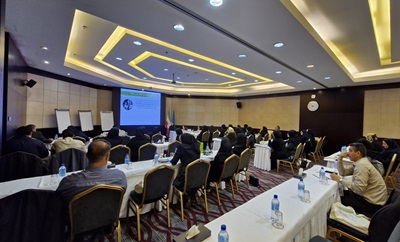UNODC Supports Iran’s Efforts to Enhance Drug Treatment Services
|
|
In a step towards addressing drug use disorders significant progress has been made in establishing widespread services for the treatment of drug use disorders over the past two decades in Iran. Recognizing the need to further improve and bridge the gap between the medication-centered and the psychological and psychosocial interventions in drug treatment, the United Nations Office on Drugs and Crime (UNODC) in Iran has taken proactive measures to address this problem in close cooperation with the national partners.
A crucial step in this endeavor was the recent organization of a comprehensive training workshop on “Assessment and Drug Use Disorders Treatment Counselling” in Tehran from 9th to 12th June 2024. This workshop, conducted in close collaboration with the Iranian Drug Control Headquarters (DCHQ) and the Ministry of Health and Medical Education (MoHME), aimed to utilize the invaluable resources of the TreatNet package, developed by the UNODC. The workshop covered essential aspects of drug dependence treatment, providing insights into evidence-based practices and equipping participants with the necessary skills for effective counselling in the context of drug use disorders. The capacity and knowledge of the participants; counsellors and treatment professionals of the MoHME and the State Welfare Organization in Tehran and Alborz provinces, on the Alcohol, Smoking and Substance Involvement Screening Test (ASSIST) screening and brief intervention basic counselling skills for the treatment of drug use dependence and basic principles of motivational interviewing were increased through a hands-on training workshop.
Dr. Majid Ghorbani, the Director General of the Treatment and Social Support Office of the DCHQ, emphasized the workshop’s alignment with Iran’s national approach and roadmap to drug treatment. He highlighted the goal of integrating non-pharmacological approaches, based on scientific evidence, with pharmacological treatments to develop more comprehensive and effective treatment plans. Dr. Ghorbani emphasized the importance of experts’ knowledge and expertise in drug treatment, especially in counselling and understanding evidence-based approaches to motivate and retain clients. He acknowledged the intensified efforts supported by UNODC Iran in achieving this goal.
Mr. Alexander Fedulov, UNODC Iran Country Representative, expressed his appreciation for the Iranian government’s dedicated efforts in combating drug use disorders. He assured that UNODC Iran, as the leading UN agency in the country’s drug control initiatives, remains committed to assisting service providers and individuals affected by illicit drugs, regardless of the circumstances. This commitment is upheld through the agency’s assistance under the United Nations Sustainable Development Cooperation Framework for Iran and its Country Partnership Programme.
The collaborative partnership between UNODC Iran and its national stakeholders holds great promise for advancing Iran’s drug treatment initiatives and better responding to the challenges posed by drug use disorders. By combining international expertise with local knowledge, this joint effort aims to enhance the effectiveness and comprehensiveness of drug treatment services in Iran. This collaboration owes its success to the generous funding by the Netherlands, enabling the realization of shared objectives and the advancement of impactful initiatives.



